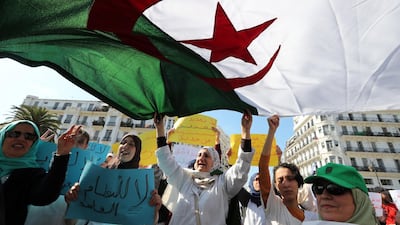It should come as no surprise that the recent eruption of anti-government protests in Algeria against the country's 82-year-old president, Abdelaziz Bouteflika, has evoked memories of the 2011 Arab uprisings.
The protests, after all, are taking place in close proximity to Tunisia, the country that is widely regarded as being the birthplace of the series of protests that swept the Arab world eight years ago. The Jasmine Revolution, so named after country’s national flower, started after the Tunisian authorities were over zealous in their treatment of a Tunis street vendor, causing him to commit suicide by self-immolation in protest.
Nor have recent anti-government protests in the Arab world been confined to North Africa. The Jordanian authorities have had to contend with hundreds of unemployed young men streaming into the capital Amman protesting at the government's handling of the economy.
The protesters, both in Algeria and Jordan, are voicing precisely the same sentiments that underpinned the beginnings of the Arab uprisings eight years ago, when anger at the inability of many ruling elites to address the needs of young and disillusioned citizens resulted in the greatest period of political turmoil the region has faced in modern history.
Moreover, the after effects of that tumultuous period are still very much in evidence today.
The chaos caused by the Syrian conflict, which began in March 2011 when protesters took to the streets to voice their anger at the Assad regime’s despotic rule, has had a profound impact not only on Syria but also on its neighbours, where the likes of Lebanon, Jordan and Turkey have been overwhelmed by the humanitarian crisis the brutal conflict has caused.
Egypt, another country that featured prominently in the early days of the phenomenon, is still coming to terms with the consequences of the popular revolt that led to the overthrow of President Hosni Mubarak.
Any hopes the protesters who occupied Tahrir Square may have entertained of improving their economic lot foundered on the incompetence of the Muslim Brotherhood government that subsequently took office, which showed more interest in imposing its Islamic agenda than reforming the country’s economy.
For many, therefore, who took part in the anti-government protests of 2011, the Arab uprisings have been nothing but a bitter disappointment.
Which is why I suspect there is little appetite in the region for a rerun of the events of eight years ago which, far from improving the economic lot of ordinary Arabs, has in many cases only resulted in even greater hardship.
That said, there will still be individual cases, such as Algeria, where the sheer scale of the ruling elite’s inability to address the needs of the people will only result in further episodes of political turmoil.
Indeed, given the way that Mr Bouteflika has governed his country during the 20 years he has held power, it is not difficult to understand why the prospect of him seeking a fifth term in office prompted protesters to take to the streets in their thousands.
For a start, Mr Bouteflika has been incapacitated by a series of strokes since 2013, and has rarely been seen in public in recent years. It is said that the ageing leader spends most of his time resident at a Swiss clinic, and the notion that he was seriously contemplating another five years in office was too much for ordinary Algerians to bear.
Responding to the protests, which originated in the capital Algiers but quickly spread throughout the country, Mr Bouteflika has now published a letter stating that he will not, after all, be standing for re-election as president, and has called off the presidential elections scheduled on April 18.
Instead he plans to convene a national conference on political and constitutional reform which will draw up a new Constitution, which will then be approved by a national referendum.
Critics of the president, though, fear this is nothing more than a neat political fix designed to reduce political tensions and allow the country's ruling elite, nicknamed Le Pouvoir by ordinary Algerians, to find a new way to maintain their grip on power.
In many respects the political stalemate Algeria is currently experiencing reminds me of Tunisia during the era of the country’s long-serving President Habib Ben Ali Bourguiba. During the 1980s, Tunisians regularly took to the streets to protest at their ailing and ineffective president, who was eventually replaced by Zine El Abidine Ben Ali, a Bourguiba protege whose failure to make any meaningful reforms of the Tunisian economy ultimately led to the protests that caused the Arab Spring.
It is vital, therefore, that Algeria does not suffer a similar fate, where the decision of the country’s ailing and out-of-touch president to stand down – assuming, of course, that this is Mr Bouteflika’s ultimate intention – only results in another of his acolytes replacing him.
It is important to remember that when the Algerian leader first came to power in 1999, he did so after the country had experienced a brutal civil war that claimed 40,000 lives.
The conflict arose after an Islamist group, the Islamic Salvation Front (FIS) appeared likely to win the 1992 elections. This prompted the Algerian army to intervene, cancel the elections and detain scores of FIS activists, thereby provoking a conflict that lasted throughout the 1990s.
While, ultimately, the Islamists were defeated, and Algeria has experienced a more tolerant form of government during Mr Bouteflika’s presidency, the Islamist threat has never completely gone away. For this reason, it is vital that when it comes to planning for Mr Bouteflika’s succession, the country’s ruling elite does not opt for more of the same, but allows the formation of a government that represents the whole country, and not just the chosen few.
Con Coughlin is the Daily Telegraph’s defence and foreign affairs editor


